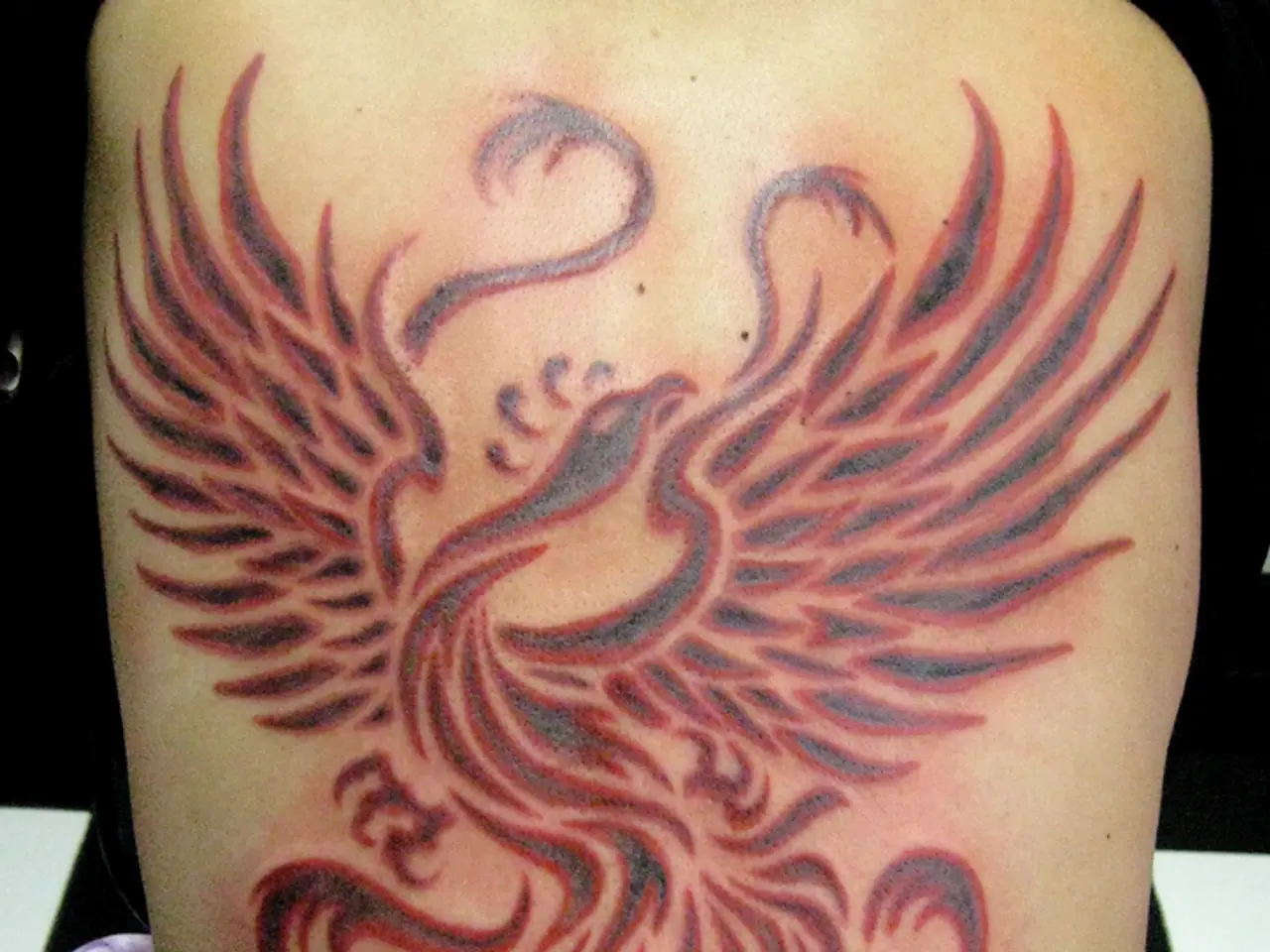Tattoo Shedding: Normal Occurrence and Timeline of Expectation
Caring for Your New Tattoo: A Guide to Healing and Maintenance
A fresh tattoo requires special care to ensure it heals properly and maintains its vibrancy. Here are some essential aftercare tips to follow during the critical healing period.
Cleaning and Moisturizing
Gently wash your tattoo with warm water and mild, antibacterial, unscented soap 2-3 times daily. Avoid harsh scrubbing; instead, pat the area dry with a clean towel or let it air dry. Apply a thin layer of fragrance-free, gentle moisturizing balm or lotion after cleaning to keep the skin hydrated and support healing. Reapply moisturizer 2-3 times per day or as needed to prevent dryness.
Avoiding Water and Sun Exposure
Avoid soaking the tattoo in water such as baths, swimming pools, lakes, or hot tubs for at least 2-3 weeks to prevent infection and fading. Protect the tattoo from direct sunlight and UV rays, including tanning beds. Once healed, use a high SPF sunscreen on the tattoo to maintain vibrancy.
Avoiding Irritation
Avoid tight or abrasive clothing over the tattoo area to reduce irritation. Refrain from picking, scratching, or peeling scabs or flakes to prevent scarring and loss of ink. Do not sleep on the tattooed area to avoid pressure and irritation, which can hinder healing.
Following Your Tattoo Artist's Instructions
Follow any specific instructions given by your tattoo artist, as they know the best practices for caring for their work.
Showering and Hydration
Shower gently starting within the first 1-3 days using lukewarm water and avoid letting the water spray directly on the tattoo. Keep showers brief and pat dry afterward. Normal showering can gradually resume as healing progresses over 4-6 weeks. Maintain a healthy lifestyle, as healthy skin supports tattoo healing and longevity.
Seeking Professional Advice
If you notice signs of infection (excessive redness, swelling, pus) or unusual discomfort, consult your tattoo artist or a healthcare professional promptly. If a tattoo is not peeling, it does not necessarily mean that something is wrong, as every person's skin and healing processes are unique.
Additional Considerations
Other factors, such as the size and type of the tattoo, can also affect the extent of peeling. Exposure to sunlight may cause tattoos to fade, so it's important to use a broad-spectrum sunscreen with an SPF of 30 or above. If a person notices a rash, inflammation, excessive itchiness, discharge, or scars, they should contact a doctor.
Proper Aftercare for Optimal Results
Good aseptic techniques and a proper aftercare routine are essential for optimal healing and results. Washing the tattoo gently with fragrance-free, hypoallergenic, and antibacterial soap is important. Proper aftercare, including using skin-sensitive antibacterial soap and suitable moisturizing lotion, is essential for the healing process. Water-based cream should be used to moisturize the tattooed area, while avoiding petroleum-based products.
Avoiding Moles and Tanning Beds
Moles should be avoided when choosing a location for a tattoo, as they may mask early signs of skin cancer. Tanning beds should be avoided as they can cause tattoos to fade and increase skin cancer risk.
Peeling and Infections
Peeling is a part of the tattoo healing process as the body rids itself of dead skin cells. However, excessive peeling could indicate a problem, especially if there are symptoms of infection and inflammation. If a person tries to peel away the skin themselves, they may cause pain, ruin the tattoo, and lead to infections or scarring.
Conclusion
Taking care of your new tattoo is crucial for its appearance and longevity. By following these aftercare tips, you can help ensure your tattoo heals well, stays vibrant, and prevents infection or damage during the critical first few weeks of healing.
- Maintaining optimum health and wellness, including managing diabetes, obesity, asthma, and other diseases, can support the overall healing process of a new tattoo.
- Some mental health conditions, like depression, bipolar, or stress, can affect skin conditions, such as ulcerative colitis, Crohn's disease, and skin-care issues, which may indirectly impact the tattoo healing process.
- It is essential to avoid exposing the tattooed area to harsh chemicals often used in skin-care products, as they can cause irritation and interfere with the healing process.
- In the realm of science, research is ongoing to develop predictive models for understanding the various factors impacting tattoo healing, incorporating elements like underlying diseases and skin conditions.
- A studious person interested in both health-and-wellness and the art of tattoos could find themselves fascinated by the interplay between mental and physical health, tattoo aftercare, and skin-care practices.
- As part of a comprehensive health regimen, an individual might also choose to consult a healthcare professional about any concerns related to their tattoo or underlying health conditions during the healing process.
- Wearing loose and breathable clothing, especially during the sensitive weeks immediately following the tattoo application, can help prevent irritation and expedite the healing phase.
- An individual with a history of certain medical conditions, such as diabetes, lupus, or autoimmune diseases, might require closer monitoring and guidance from their healthcare provider during the tattoo healing process to minimize the risk of complications.




